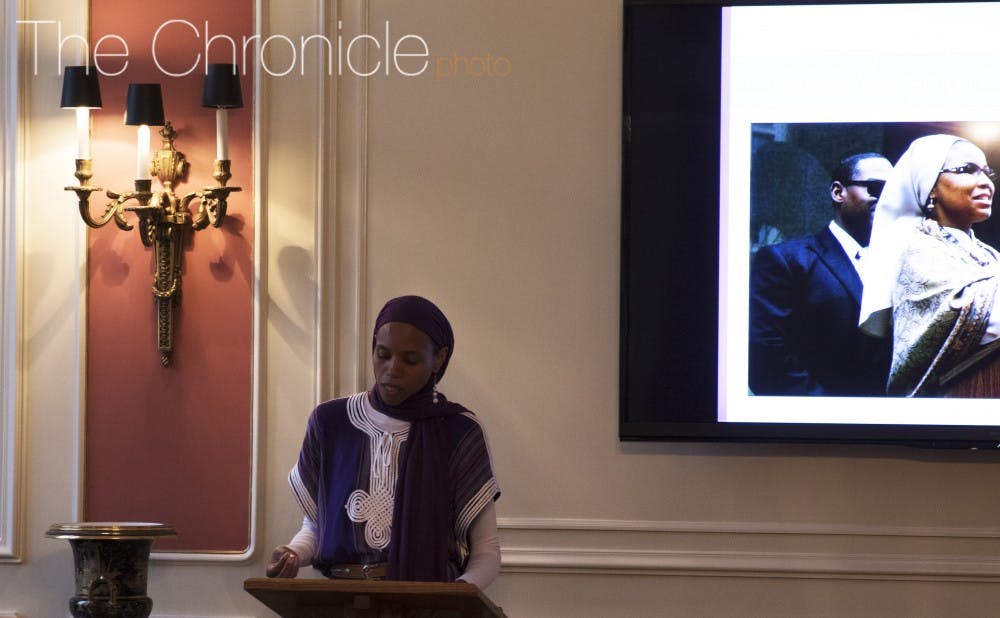Author and blogger Jamillah Karim, Pratt '97, discussed the intersection of Islam and black feminism Tuesday night.
Introduced by Ellen McLarney, associate professor of Asian and Middle Eastern studies, Karim drew from the narratives of two women she interviewed for her 2014 book "Women of the Nation: Between Black Protest and Sunni Islam," which focuses on illuminating the contributions of women to the Nation of Islam movement.
One of the women she spoke with, Sandra El-Amin, was Karim’s teacher when she was growing up in Atlanta and attending a Muslim school. El-Amin later became the director of the school.
"It made sense to me that women had a primary responsibility for homemaking, and rearing children, training children––even in terms of establishing schools,” Karim said, quoting El-Amin. “But in terms of intelligence and talent, there was no superiority. In God’s sight, piety and good conduct elevated one person in rank over another—not gender.”
While at Duke, Karim studied electrical engineering as an undergraduate and then obtained a Ph.D. in Islamic Studies in 2004. Her talk was sponsored by the Asian and Middle Eastern Studies department, the Duke Human Rights Center at the Franklin Humanities Institute, the Duke Islamic Studies Center and the Gender, Sexuality and Feminist Studies department.
Karim explained that the Nation of Islam has tenets that allow black women to have a unique perspective on feminism and leadership.
“Women in the Nation of Islam use Muslim modesty codes as a tool in creating platforms and discourses to protest the typical portrayals of black women as sex objects,” she said.
Modern understandings of religion emphasize its role as a means of “personal uplift,” which Karim attributes partially to televangelism. In contrast, the kind of religion she observed in women of her mother’s generation was focused on community.
However, Karim noted that another of her book's subjects, Khaleelah Muhammad—a community activist who was a believer of Sunni Islam before joining the Nation of Islam—believed that the two goals do not have to stand in opposition.
“Khaleelah embodies the ideal movement between social consciousness and personal transformation, which Khaleelah considers essential complements to each other, especially for black women, whose self-esteem has suffered from white supremacy,” Karim said.
Karim, who came to Duke in 1993 intending to become an engineer, ended up as a professor of religion at Spellman College before leaving that position to homeschool her children.
She explained that the Nation of Islam places an emphasis on “equal but different roles” for women and men. She also said that black Muslim women must “fight multiple fights” as members of multiple marginalized identities.
“Before coming to the nation, I had hated that God had made me a woman because of the unfettered abuses that I had experienced at the hands of boys and men,” Karim said, quoting her subject Muhammad. “But this changed with the teachings of the honorable Elijah Muhammad, who taught that the woman was to be revered and respected. Now, I wear my femininity as a badge of honor. I am proud to be a mother, and I am proud to be a wife. My femininity is the highest gift that God could ever give."
Get The Chronicle straight to your inbox
Signup for our weekly newsletter. Cancel at any time.

